 Petzlover
Petzlover Hermes Bulldogge is originated from United States but Northern Inuit Dog is originated from United Kingdom. Hermes Bulldogge may grow 18 cm / 7 inches shorter than Northern Inuit Dog. Hermes Bulldogge may weigh 20 kg / 45 pounds more than Northern Inuit Dog. Both Hermes Bulldogge and Northern Inuit Dog has almost same life span. Hermes Bulldogge may have less litter size than Northern Inuit Dog. Hermes Bulldogge requires Low Maintenance. But Northern Inuit Dog requires Moderate Maintenance
Hermes Bulldogge is originated from United States but Northern Inuit Dog is originated from United Kingdom. Hermes Bulldogge may grow 18 cm / 7 inches shorter than Northern Inuit Dog. Hermes Bulldogge may weigh 20 kg / 45 pounds more than Northern Inuit Dog. Both Hermes Bulldogge and Northern Inuit Dog has almost same life span. Hermes Bulldogge may have less litter size than Northern Inuit Dog. Hermes Bulldogge requires Low Maintenance. But Northern Inuit Dog requires Moderate Maintenance
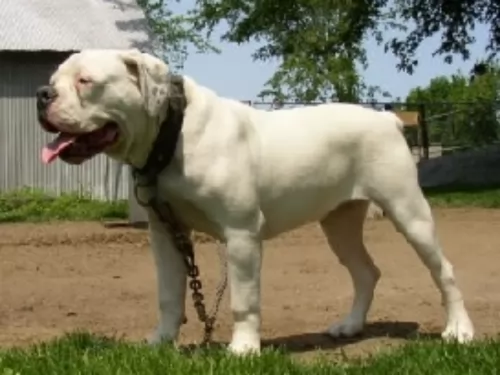 The Hermes Bulldogge is not a breed in itself, but is actually a line within the English Bulldogge line. The Hermes family in the United States bred this line for several years. The Hermes Bulldogge line is the largest of the re-creations from the English Bulldogge. They are inspired by the arena dogs from the days of the Roman Empire. Greg and Linda Hermes have bred healthy, smart, resilient and agile dogs. The desire of the Hermes was an attempt at recreating the 17th century dog.
The Hermes Bulldogge is not a breed in itself, but is actually a line within the English Bulldogge line. The Hermes family in the United States bred this line for several years. The Hermes Bulldogge line is the largest of the re-creations from the English Bulldogge. They are inspired by the arena dogs from the days of the Roman Empire. Greg and Linda Hermes have bred healthy, smart, resilient and agile dogs. The desire of the Hermes was an attempt at recreating the 17th century dog.
They used a variety of breeds to create the Hermes Bulldogge, most of whom are never disclosed. Some of the dogs that were probably used include: English Mastiffs, American Bulldogs, Old English Bulldogges, and pit Bull Terriers. This family of dogs are playful, friendly, and good family dogs. They have a strong prey drive which makes them good hunters but not as good around other small animals or small children. The Hermes have been breeding the Hermes Bulldogge since since 1983. The puppies are all hand raised, child friendly with great health.
When discussing the Hermes Bulldogge, one must go back to the root of the English Bulldogge. That breed comes originally from England and various lines have been recreated by various breeders. The breeding of the Old English Bulldogge with Mastiffs and Pits lead to other lines that the breeders called Old English. But most fanciers believe that only two lines of the original Old English Bulldogge remain and that is the Leavitt and the Hermes.
Some form of bulldog has been in existence since 700 years ago and as it was mixed with a variety of other breeds it took on other forms over time. The English Bulldogge was a definite couch potato. Instead of being bred for a job or look, the Bulldogge was developed with temperament, ability and health in mind. This has made for a great family dog without a lot of veterinarian bills.
 Looking at the beautiful Northern Inuit Dog, you’ll think that this crossbred dog is a wolf.
Looking at the beautiful Northern Inuit Dog, you’ll think that this crossbred dog is a wolf.
As with many other dogs, there are sometimes different stories regarding their history. It was in the 1980's that founder of the breed, Eddie Harrison, bred a number of mixed-breed rescue dogs with Siberian Huskies, German Shepherds and Alaskan Malamutes to produce the early Northern Inuit dogs. This is a dog that closely resembled a wolf in looks but which has the more companionable characteristics of the domesticated dog.
The dog is only recognized by its own independent breed club, but by none of the other major kennel clubs.
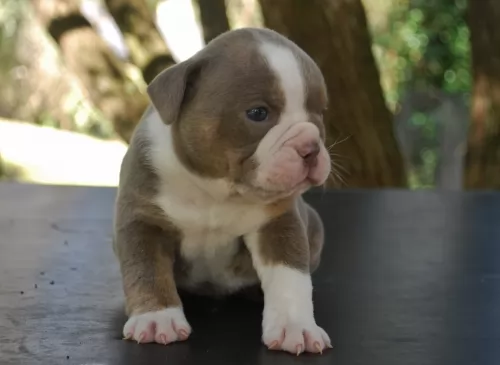 The Hermes Bulldogge, much like the original Olde English Bulldogge, is taller, healthier, more athletic than the original English Bulldog. They are medium height, with a large head, a strong body and a deep, wide chest and broad shoulders. Tails might or might not be docked but the ears are never docked. They n have a moderate amount of wrinkles and a longer, less smashed face than the original. It is easier for the Hermes Bulldogge to breath, to fly and to live in warmer environments that it is for the English Bulldogge. His eyes are lower in his head but in the front center.
The Hermes Bulldogge, much like the original Olde English Bulldogge, is taller, healthier, more athletic than the original English Bulldog. They are medium height, with a large head, a strong body and a deep, wide chest and broad shoulders. Tails might or might not be docked but the ears are never docked. They n have a moderate amount of wrinkles and a longer, less smashed face than the original. It is easier for the Hermes Bulldogge to breath, to fly and to live in warmer environments that it is for the English Bulldogge. His eyes are lower in his head but in the front center.
They are very dark almost black. Eyelids should cover the white of the eye and they have rounded cheeks. They have a short muzzle and short face. Broad, thick lips finish out the face with very large, square, broad jaws.
 Friendly, calm and gentle, the Northern Inuit Dog is a crossbreed, described as a medium to large sized dog that stands at roughly 58– 81cm in height, male and female, and weighs in the region of 25–48kg.
Friendly, calm and gentle, the Northern Inuit Dog is a crossbreed, described as a medium to large sized dog that stands at roughly 58– 81cm in height, male and female, and weighs in the region of 25–48kg.
He has a double coat in typical wolf shades of grey, white, black and cream. He is regarded as a moderate shedder. The ears are erect, the face bright, intelligent and alert and the tail long, bushy and straight.
The Northern Inuit dog is independent, strong-willed and stubborn, and if you want to own one of these dogs, your dog will respond well if you are firm, fair, strong, kind and consistent. This is because the dog is stubborn, sharp, independent and intelligent.
The owner of such a dog must be a firm leader. Training and socialization should start when the dog is still young. He is good with kids, being playful and affectionate with them.
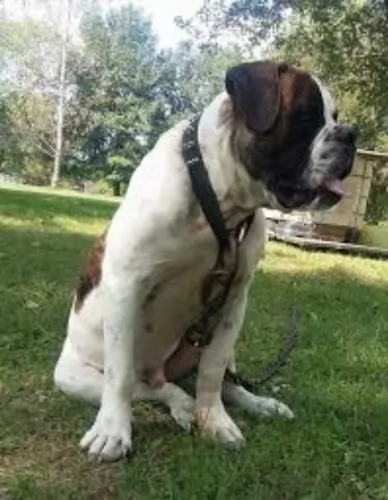 If socialized properly this line of bulldog is harmful to me.
If socialized properly this line of bulldog is harmful to me.
Strong and athletic, his strength and stamina.
He is not very adaptable. Apartments are not good for this dog. He needs to run and if possible to hunt.
He is very intelligent but stubborn which affects his learning ability.
 It’s not surprising that people who love wolves would want a similar looking pet. However, they also want this wolf-like dog to be a friend and companion. This is precisely what they get with the beautiful Northern Inuit dog.
It’s not surprising that people who love wolves would want a similar looking pet. However, they also want this wolf-like dog to be a friend and companion. This is precisely what they get with the beautiful Northern Inuit dog.
With his bright, alert face, the Inuit is actually a calm, gentle dog, bonding closely with his human family and not showing any aggression.
Intelligent and social, and somewhat stubborn, when you provide him with the home he deserves, you’ll see that this beautiful creature can be relied on to be a wonderful family pet.
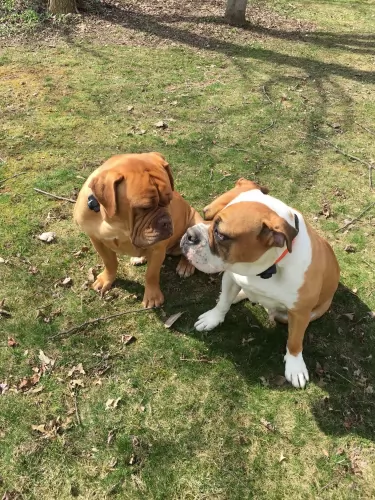 The Hermes Bulldogge is healthier than most bulldogs. His face is not as smashed and he is not as wrinkled. He can breathe easier than other Bulldogs. The two major concerns are hip dysplasia and bloat.
The Hermes Bulldogge is healthier than most bulldogs. His face is not as smashed and he is not as wrinkled. He can breathe easier than other Bulldogs. The two major concerns are hip dysplasia and bloat.
Hip Dysplasia also some elbow dysplasia: can cause lameness and arthritis
Terminal unless treated immediately. Can be prevented by not feeding large meals before or after heavy exercise.
 There are some genetic problems with this dog breed, although with good care, you are highly unlikely to see your dog with them.
There are some genetic problems with this dog breed, although with good care, you are highly unlikely to see your dog with them.
Some of these are hip dysplasia and epilepsy.
Hips are always a worrisome aspect with dogs as it can bring on lameness. There are some things that can be done to reduce the incidence of hip dysplasia.
Joint laxity in dogs occurs when the head of the femur doesn’t fit into the acetabulum properly. This could be the result of several things such as the dog being overweight, injury or something else.
Epilepsy in dogs is a chronic condition that results in seizures. This neurological disorder is actually a life-long disease, occurring when there is abnormal electrical activity in the brain and which changes a dog’s behavior.
Some breeds are more predisposed to epilepsy than others but you will need to get your dog to the vet when you see your pet jerking uncontrollably. Most of these epileptic fits happen without warning, they last a few seconds to a minute or so and stop on their own.
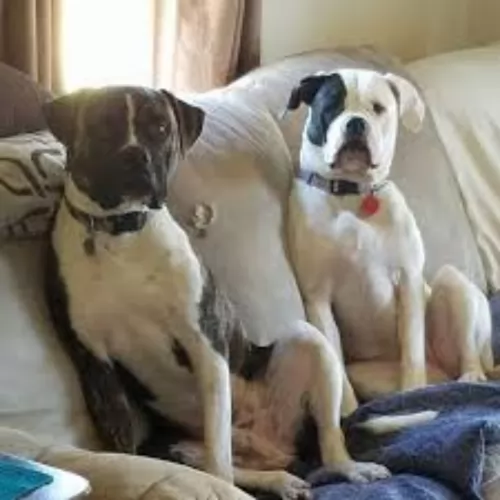 When feeding a Hermes Bulldogge puppy be sure you feed puppy meal for bulldogs or medium dogs. For first year fee 2-4 times a day 2 cups food.
When feeding a Hermes Bulldogge puppy be sure you feed puppy meal for bulldogs or medium dogs. For first year fee 2-4 times a day 2 cups food.
Feed the adult a solid adult dry food. 2 cups twice a day.
Better health than most lines of Bulldogs. Few wrinkles and less problems breathing as he doesn’t have a smashed face.
He doesn’t need a lot of exercise but daily walks and lots of play time. He can enjoy Lure Coursing obedience, agility and obedience
 It’s no longer cheap caring for a dog – just like with a child, by bringing a dog into your home, you have a responsibility to care for it.
It’s no longer cheap caring for a dog – just like with a child, by bringing a dog into your home, you have a responsibility to care for it.
If you bring a puppy into your home, you will need to feed him 4x a day. If you feed him commercially manufactured food it will need to be specially formulated for puppies. You will have to read on the packaging to make sure you get the right food.
Later on your pet can start having one or two meals a day. Two smaller meals is best as then he doesn’t gobble up his food too fast which can lead to a life-threatening condition known as bloat. Home-made food is always a welcome treat for your pet, but keep it simple and consistent. Boiled chicken, brown rice or pasta and some cooked vegetables such as carrots, sweet potatoes and spinach chopped up and added to his dry kibble can offer him some variety from time to time as well as also adding in some raw meat when you get the chance. He must always have access to fresh, cool water.
Your puppy will be due at the vet for his first vaccinations. Your puppy's first vaccination will usually be at about 8 weeks of age.
Your new pet will require a warm, dry, comfortable place to sleep and to retreat to.
You will need to provide him with chewy toys to stimulate him both mentally and physically.
You will need to exercise your pet – nice long walks, ball- and rope games etc.
Nearly every dog sheds, and the Northern Inuit will require you brushing him twice a week to remove all those loose hairs. During the brushing session, check him over for fleas and ticks and run your hands over him and make sure there are no unusual lumps on his body.